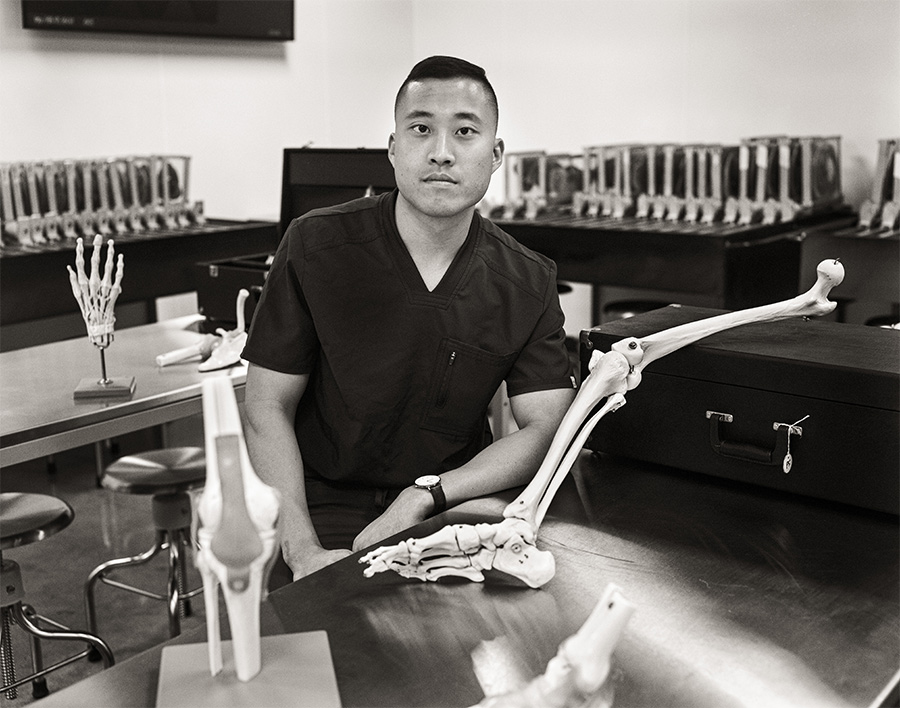 Graduate School of Biomedical Sciences
Graduate School of Biomedical SciencesMichael Dang Didn’t Want to be a Doctor, but Cancer Forced Him to Reconsider
Then he lost 30 pounds in 10 days.

In 2010 he began his freshman year at the University of Texas McCombs School of Business. The summer before his sophomore year, he woke up sick — so sick he could barely walk.
Hobbling to his car, he drove home, arriving at 11 a.m. and then sleeping until 8 p.m. the following day. He woke up drenched in sweat. That was only the beginning.
Three days later, blood blisters ravaged the inside of his mouth.
Then the nausea hit. Dang couldn’t eat. He couldn’t work out. He couldn’t move. Night sweats and nausea made it challenging to attend his summer courses. Then the weight started coming off. Arnold Palmers didn’t pack many calories, but they became his main intake as they were the only thing he could stomach.
When the bruises began to appear, he decided he needed to see a doctor. “I was literally falling apart in the span of four days, it was surreal.”
An initial examination led his primary care physician to suspect Dang had immune thrombocytopenia (ITP) — an autoimmune disease resulting in low blood platelet counts. Dang’s platelet count was in the 2,000s, which seemed to support the diagnosis as normal blood platelet counts range from 200,000 to 400,000.
However, the physician wanted a second opinion and referred Dang to a the Texas Oncology clinic in Bedford, Texas, for a more advanced blood panel. At this point Dang’s main goal is to avoid a car accident, cutting himself with a razor or anything that causes bleeding since his body won’t be able to produce blood clots due to such low platelets.
The hematologist agrees with the primary care physician’s diagnosis. He sends Dang home telling him they’ll work on a game plan for treatment, most likely a prednisone regimen.
An hour after the appointment, Dang’s phone rings:
Michael Dang?
Yes?
This is Texas Oncology-Bedford. We need you to come back in immediately.
Dang’s mother and sister accompany him to the hematologist’s office they wait 40 minutes for the doctor, who is on the phone consult with oncologists in Dallas.
“We suspect you have acute lymphoblastic leukemia,” he tells Dang. “We are transferring you to Texas Oncology-Medical City right now.”
While driving to the Medical City clinic, Dang is making calls to cancel plans, withdrawing from classes and calling his roommates to back out of his apartment lease. While on the phone with his best friend, Brian, reality sinks in.
When he arrives, the oncologists confirm the cancer diagnosis.
While the air in the room is stifled by shock, Dang’s thinking, This is surreal. I’m 19. Cancer is for older people. I’m really healthy — how can I be a cancer patient?
Texas Oncology-Medical City will be his part-time home for the next 18 months. He begins chemotherapy immediately as the doctors inform him, “Had you waited three to five more days, you would’ve died.”
Dang underwent another spinal tap for more blood tests. He had had some serious conversations with doctors since the beginning, but the feel of the room when he walked in for these test results was different.
“You have a Philadelphia positive translocation, which is diagnosed in only 1% of ALL patients your age,” said the oncology team. “This is considered terminal — your prognosis is 18% at best.”
That makes sense, Dang thought. I’m the king of either really good luck or really bad luck.
From August to November, Dang is in the pediatric cancer unit receiving chemotherapy treatments. Day one, he’s determined to walk out of the room after his injection of chemo, which tastes like liquified pennies. While his body did atrophy during chemo, he was still standing. Two months later, radiation begins — he needs a wheelchair.
“Those days in the pediatric cancer unit would end up defining the rest of my life,” he said. “I was never interested in medicine because I couldn’t relate to those who were sick and hurting. I developed that empathy watching young children going through this with me.”
As Dang moved into the intensive care unit for his radiation and bone marrow transplant, he had one of the worst diagnoses in the unit. On the eve of his transplant, he wrote the words, “While life has cast me into the fire, out of the ashes I will rise.”
February 2012, Dang’s cancer was in remission. He was free to pick his life back up from where he left off, but he was different now. He had tried to outrun his medical career destiny, but life forced him to surrender to it. “I now had the tools to be a physician,” Dang said. “I could provide that often missing component. I relate to terminal disease and that puts me in a unique position that I could no longer ignore.”
In August 2021, on the 10-year anniversary of his cancer diagnosis, Dang will enter medical school at TTUHSC.